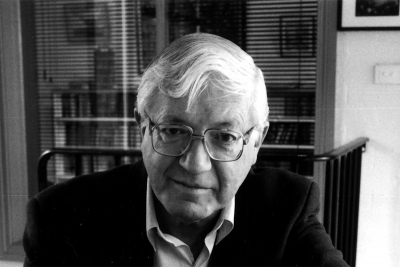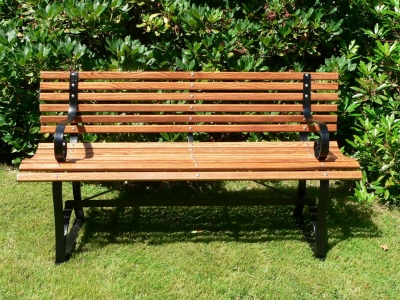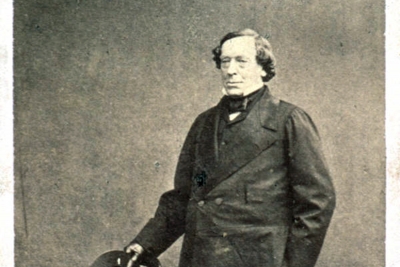Essay
About a decade ago, I picked up a book because I liked the cover: bleak street, stark buildings, empty sky, a robed man, his back turned, in the distance; in the foreground, a woman in a burka looking to the left at something we can’t see. When the blurb promised me ‘a Middle Eastern Turn of the Screw, with an insidious power to grip’, I bought it. It gripped. In fact, it scared the living bejesus out of me. That was my introduction to Hilary Mantel’s writings. Since then, I have read nearly everything she has published.
Eight Months on Ghazzah Street (1988) is about a sensible young couple who, after years of humanitarian work in Africa, decide to go to Saudi Arabia to repair their fortunes. The husband will work on a seductively extravagant building project; the wife will read, write and relax in their pleasant, if mildly claustrophobic, apartment. Then small things begin to go wrong.
... (read more)Some years ago I wrote a poem called ‘A Table of Coincidences’, which contained the lines: ‘the day Christopher Columbus discovered America / Was the day Piero della Francesca died.’ This is a verifiable fact, unless changes in the Western calendar have altered things. Clearly, I was being sententious and reactionary: the ancient good of the world and its new doubtfulness seemed to start on the one day. A hostile reviewer pointed out that every date in the world is the anniversary of some other date, and poured scorn on my notion by suggesting that a momentous event like the Armistice in 1918 might share a date with the invention of Coca-Cola. But we still honour anniversaries, and I am only too conscious of the 365 days that have passed since 11 September 2001.
... (read more)Death and bereavement come to us all, often as the most challenging experiences of our lives. In the end, we must all confront the inevitability of our own mortality. A study of dying and responses to death takes us to the heart of the history of any culture, and sharpens our understanding of the meaning of our lives. Despite the significance of death in human life, Ken Inglis and other scholars observed in the twentieth century ‘a modern distaste for the physical facts of mortality and a modern aversion to the darkness of mourning’. Only in the last twenty years has the taboo on death begun to lift. Public and academic concern has been stimulated by the AIDS epidemic, by debates about euthanasia, palliative care, and suicide rates, and by medical technology’s increasing interventions to prolong life. However, historians in Australia have been slower to participate in this discussion than colleagues in France, the USA, and Britain, especially for the nineteenth century. My own contribution is a book entitled Australian Ways of Death: A social and cultural history 1840–1918, and this essay tells an essential and distinctively Australian part of that story.
... (read more)Bad art is where the personality of the artist reveals itself most fascinatingly, according to Lord Henry Wootton, the Wildean aesthete in The Picture of Dorian Gray. It is an idea that assumes an unexpected relevance as we reach the tenth anniversary of what is perhaps the strangest phenomenon in Australian publishing history.
... (read more)A few weeks ago, I attended the session on ‘What is an Australian Classic?’ during the Sydney Writers’ Festival. My own definition of what makes a classic is a simple one: a book from the past that retains significance, that still entertains and enlightens us, even though we may respond to it in quite different ways from its initial readers. In some cases, of course, classics were not so highly regarded on first publication. Even Gerard Windsor, at the festival, had to concede that Joyce’s Ulysses was a classic; it was of course banned in Australia, and elsewhere, for many years. And one of the eight titles in the first series of A&R Classics, Come in Spinner ($21.95pb, 0 207 19756 3), also received a very mixed reception, as one of its authors, Florence James, remembers in the introduction she wrote in 1988 for the first printing of the unedited version of the novel. In 1951, the Sydney Daily Telegraph called Come in Spinner ‘a muckraking novel fit for the literary dustbin’, even though it had earlier won the newspaper’s own novel competition!
... (read more)Querulous impatience has overtaken discussion of Aboriginal matters in some quarters. ‘If we apologise, they must forgive and then assimilate. Invite them to discussions about how to ameliorate their misery – the disintegration of community, the alcoholism, the glue sniffing. But they mustn’t talk “ideology”. We’ve had enough brooding over the past, heard enough about treaties and self-determination, and more than enough about genocide. It’s time to move on.’ That’s what I hear and in that tone.
... (read more)I’m not keen to be at this dinner party at Carol’s. I find her hard to take sometimes, with her endless stories about her life in Maningrida. Her husband is away. Instead, there’s Graham, who’s been here nearly ten years; Laurie, who has visited the community from time to time since the 1970s; and Lisa, who is a few years older than me and who runs the art c ...
You know you are getting old when one of your students, genuine in her puzzlement, says to you, ‘Who was Bob Santamaria?’ Santamaria? The most famous lay Catholic since Ned Kelly! The man whose machine split Australian Catholicism for a generation; whose politics kept Labor from office for two decades; whose disciples and friends still move through the corridors of power in church and state! To meet someone to whom Santamaria is an unfamiliar name is to know that you too will soon be history.
... (read more)If we look back into past times, we find innumerable names of authors once in high reputation, read perhaps by the beautiful, quoted by the witty, and commented upon by the grave; but of whom we now know only that they once existed.
Samuel Johnson
Sometimes the situation in Australia, with respect to writers, resembles that in early eighteenth-century England.
... (read more)I grew up in a once-upon-a-time land when milk and loaves appeared at the door to the jingle of bells and the clopping of hooves, when housewives were wistful Cinderellas in sacking aprons and hair permanently rollered for the ball, when men wore hats, and lifted them to the funerals of strangers passing in the street. That time – the forties, the early fifties – has been mythologised into a Camelot of Anglo-Celtic virtue, or a dark age of tribalism and British cooking. In my recollection, of course, it was neither, but simply the way things were. It is disconcerting to find one’s private past, one’s little collection of ordinary memories, become a matter of ideological dispute, and to discover, after peaceful decades spent reading historical documents, that you have become a historical document yourself.
... (read more)


